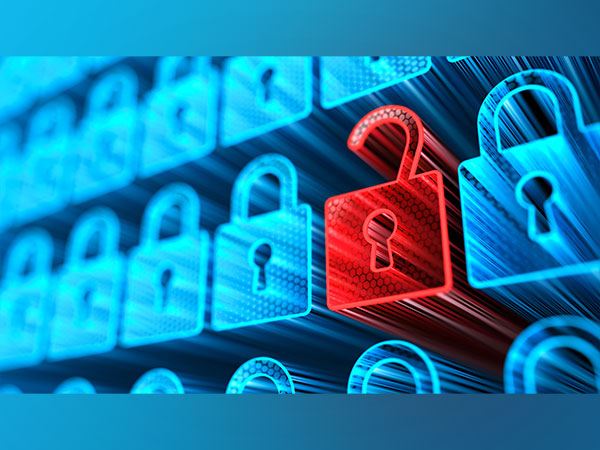Cybersecurity tips for the digital era
Jul 16, 2024

ATK
New Delhi [India], July 16: With the increasing dependency on the cyber world, the risk of exposure to vulnerabilities and confidentiality has increased considerably. Cybercriminals are always on the lookout for loopholes to expose your confidential information and attack accordingly. Unless you desire to fall prey to their hands, it is best to ensure the most advanced and latest cybersecurity practices to keep yourself and your firm's name safe and secured.
Investing in cyber insurance may act as a protective shield in the case of any cyber crimes that you may have experienced. However, as the saying goes, "prevention is better than cure" holds too true in this respect. You must exercise steps not to face any such issues ever, ensuring the implementation of the latest cybersecurity measures.
In this article, we will discuss certain obvious cybersecurity measures that minimise the risk of getting into cybercrime attacks.
Cybersecurity measures to exercise
1. Always maintain updated software
You must maintain the latest version of all the software you are using. This will help to add new features, upgrade security measures, and fix unknown bugs.
2. Avoid suspicious mail
You might be receiving several emails from various sites. Amidst such a crowd, certain scammers might set up an enticing phishing scam to attract you. Beware of such emails. If anything looks suspicious, never try to open such emails. Such scammers might try to impersonate certain individuals or eminent firms, coming up with amazing offers and discounts. At times, these emails may contain certain links or attachments which may infect your device(s).
3. Updated hardware
Outdated hardware cannot support the recently updated software and, therefore misses out on the latest security upgrades. Moreover, old hardware versions are comparatively much slower in responding to advanced cyber attacks.
4. Encrypt data
If you need to share confidential information regularly, then regular email should be avoided. You must resort to a dependable file-sharing solution which will automatically encrypt confidential data and ensure security. This will prevent all unauthorised users from accessing your private and confidential information.
5. Use anti-malware and anti-virus.
Keep your device always equipped with competent anti-virus and anti-malware installation. Constant cyber exposure risks malware attacks. It cannot be negated entirely. However, installing such software negates the risk to a considerable extent.
6. Use VPN
If you are using cyber platforms constantly, it is best to avoid public networks and set up your personal VPN to ensure connection encryption.
7. Never click unknown links
These days, clicking links can lead to havoc. It may completely siphon off your bank account or result in some other serious setbacks. Therefore, never ever click any link unless you are absolutely sure of the source.
8. Secured passwords
Passwords are meant to secure your privacy. Use it well and don't be reluctant in setting it up too simply. You can use advanced tools to secure your passwords.
9. Bluetooth disability
Never keep your Bluetooth open unnecessarily, when you aren't using it. Hackers may use it as a reliable tool to hack your device easily.
10. Two-factor authentication
Always use the two-factor authentication security system to keep all your accounts secure. It verifies the identity of the user and keeps the data secured.
11. Remove adware
Adware is a digital tool that collects your personal interest and sends you personally targeted ads. To ensure privacy it is best to keep all sorts of adware at bay.
12. Always use HTTPS websites.
If you aren't using an HTTPS website, there is no assurance that the information exchanged between you and the site concerned will remain private. Always choose an HTTPS website.
13. Never share confidential information on non-secure sites or platforms
Avoid sharing any sort of private or confidential information on any non-secure cyber platform. While storing any important information online, use a secured platform that cannot be used by unauthorised users.
14. Scan external storage devices used
If you are using any sort of external storage device, always scan it first to ensure it is free from viruses.
15. Avoid public networks
If you are using cyber power to share confidential data often, it is best to avoid public networks. It makes it all the more vulnerable. Set up a VPN to ensure less exposure and more security.
16. Not "secured enough"
Unless you cut yourself out completely from the cyber world in all aspects, you cannot expect anything to be "secured enough". Therefore, exercise all the plausible security measures that you can lay your hands upon, but still do not expect complete security. Even after exercising all these security measures, you must still invest in competent cyber insurance, because if anything goes wrong, it can act as a protective shield.
17. Security upgrades
Whenever any security upgrades are available, never delay in downloading and installing them. This investment is not a luxury, but more than a necessity. The consequences of any sort of security breach are beyond imagination. It is always a very hefty cost to pay when compared to investing a negligible amount in upgrading the security measures at the earliest as per requirement.
18. Back-up files
A security breach can lead to data loss. However, you must always keep yourself prepared for such unwelcome and undesired situations. You must be able to restore all the important data immediately even when they are lost or breached. Ensure to maintain backup files of all the important information either on the cloud or on the local storage device you are using.
19. Trained employees
If you are leading a firm, ensure that all your employees are well-trained and aware of the importance of exercising advanced and latest cybersecurity practices. This has to be a consistent approach from all your employees. A single mistake from any unaware employee can lead to sheer disaster.
20. Your website must be HTTPS.
If you are managing a valid website, never fail to install the SSL certificate and enable HTTPS on your site. This will ensure the encryption of all data and information exchanged between your web server and all the other browsers of your visitors.
21. Employ "white hat" hackers.
Hacking is bad, but there is something called "ethical hacking". This is a process that allows you to explore the probable ways hackers may attack you so that you can exercise secured protection accordingly. Try to employ experienced "white hat" hackers who can expose the security flaws, keeping them updated and patching the loopholes to ensure enhanced security. Employing one of them might give you a good return. You might become aware of certain cybersecurity flaws that you never knew existed at all.
Conclusion
The need for cybersecurity cannot be emphasised in this digital era. A single flaw or undesired exposure can lead to havoc. To avoid such undesirable circumstances, it is best to keep yourself updated with the latest and most advanced cybersecurity measures.
Disclaimer: The above information is for illustrative purposes only. For more details, please refer to the policy details and prospectus before concluding the sales.
(ADVERTORIAL DISCLAIMER: The above press release has been provided by ATK. ANI will not be responsible in any way for the content of the same)


![Dr. Raghupati Singhania, CMD, JK Tyre & Industries and jury members presented Indian Car of the Year [ICOTY] 2025 award to Mahindra & Mahindra team](https://worldnewsn.s3.amazonaws.com/media/images/ANI-20250111122719.jpg)






